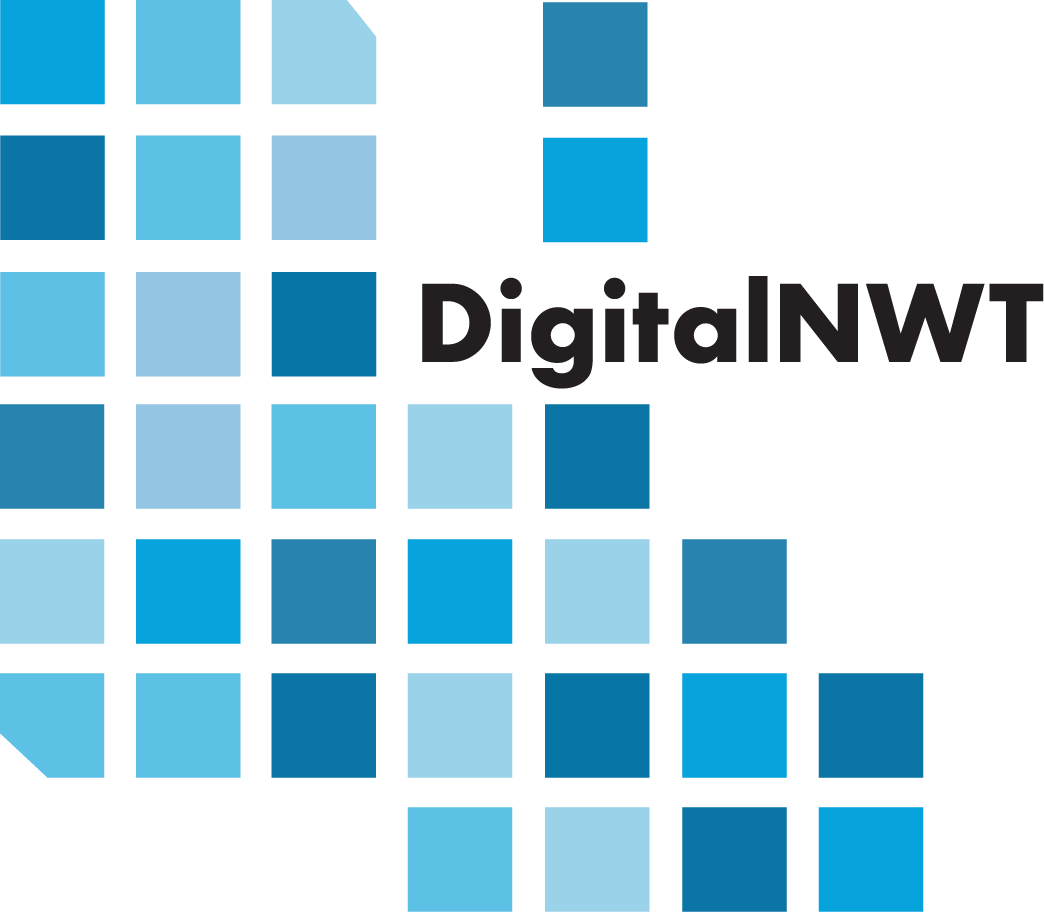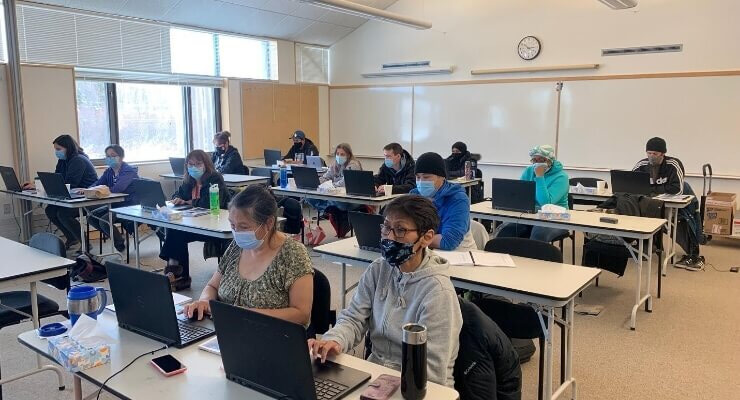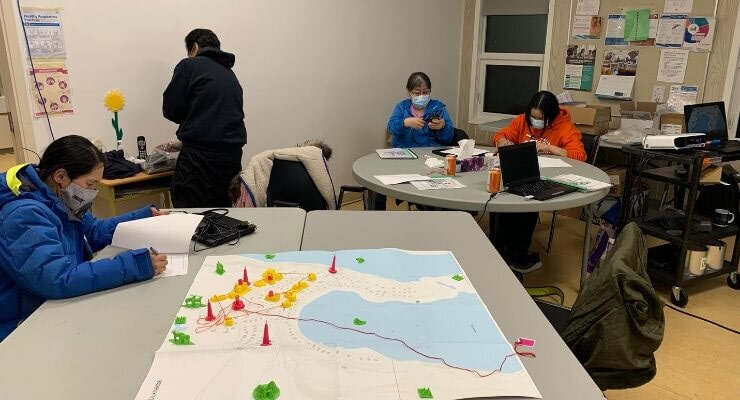DigitalNWT Finalizes and Delivers First Course
Three years in the making
November 4, 2021
Three years in the making, DigitalNWT has released their first course. The course highlights three introductory modules, addressing basic digital literacy, from digital devices, the internet and social media, to being pro-active online.
(Above) 14 total participants attended this Course 1 in-person session in Inuvik.
A look into course 1
Ryan Kochon took Course #1 this Fall. He is from Colville Lake, but moved to Inuvik with his family for college.
“It was good – good experience for me. I learned a few things about the computer, and some stuff I learned there. The basic stuff, I learned. I already knew, before, but I had to re-learn again because I hadn’t been on the computer for so long.”
Ryan says he feels more comfortable with digital technology after having taken the course.
“There was things that I learned that were really important to know about technology — like sometimes, when you’re out on the land, using your boat, you have to use GPS. There’s that new, with the cell phones that you hook up out on the land — Inreach — and stuff like that, you have to know. So, it’s good to know this technology!”
he DigitalNWT team is planning to release two more courses before March.
Dr. Michael McNally from the University of Alberta is a co-investigator with DigitalNWT. He is responsible for leading the team of five researchers designing the curriculum. The courses are then taught by local instructors — mostly Community Adult Educators at Aurora College — in their community. These instructors receive support from the curriculum team through train-the-trainer events.
“After getting the bearings the first year, we originally went up to Inuvik in 2019 for train-the-trainer programming,” says McNally. “What was 100 slides of potential subjects became, now, the complete package, which — four modules, plus introduction and conclusion — is 543-slides.”
The course focuses specifically on Northern content related to digital literacy, and includes videos made by Indigenous content creators in the NWT. Course 1 consists of four introductory learning modules presented in a "choose-your-own-adventure" format.
DigitalNWT’s course schedule is as follows:
Course 1 - Basic Digital Literacy
4 Modules: Digital Devices, Internet, Social Media and Applications (Apps), and Being Proactive Online (Fall 2021)
Course 2 - Introduction to Digital Content and Connectivity
2 Modules: Digital Content, and Digital Connectivity (Make the NetWork) - Early Winter 2021
Course 3 - Digital Storytelling
Winter 2022
Makeup of the first course
The content is made up of visually rich content, and is designed to accessible for learners of all ages.
The course features digital innovators from the Northwest Territories. Additionally, learners can expect to hear more about NWT-based groups — like FOXY (Fostering Open Expression among Youth) and SMASH (Strength, Masculinities, and Sexual Health) — while also learning about technology groups and policy developers — such as the CRTC (Canadian Radio-television and Telecommunications Commission) and CIRA (Canadian Internet Registration Authority).
Learners can expect 20% of the course content to be features of NWT-based digital innovators . The course materials also feature music, photos and artwork from Northern artists and musicians, who have been compensated for their contributions to the project.
Belinda Ongaro is the curriculum manager with DigitalNWT. She just finished her MA in Library and Information Studies at the University of Alberta, and is now living in amiskwaciy-wâskahikan (Edmonton, Alberta).
Ongaro says, “We hope to empower learners to explore technology and the digital world with cautious curiosity and a sense of responsibility.”
Ongaro stresses the importance of NWT-specific content, saying, “We’re just making sure that we’re listening to the people who are actually teaching or taking the courses — because at the end of the day, they’re the ones who need to be satisfied with this material.”
The course materials were developed with feedback from community members and adult educators, as well as learners. This course design feedback was received through community surveys and responses during the live training sessions.
(Above) Learners in Course 2 in Ulukhaktok developing community network models.
A 250-page facilitator guide complements the slides, and provides “a lot of good content for people to facilitate it.” This facilitator guide is designed so that any interested party can teach the course in their home community.
McNally says the idea is to “meet the learners where they are, where the learners are anywhere from 18-48, from Fort Smith to Paulatuk, who in many ways may already be a local digital tech innovator themselves.”
Challenges while developing the course
The first iteration of the course had been designed for face-to-face delivery. However, the implications of COVID-19 meant redesigning the course for remote and digital delivery. This meant addressing and finding solutions to the NWT’s digital divide.
Ongaro had to create resources for digital delivery, saying, “We needed to use pre-recorded video, we needed to use USB keys, which obviously requires a lot of prep work. You have to make sure these videos are edited and somewhat refined…. This included scripting, editing, recording, adding images.”
Other solutions to bridging the digital divide included coordinating programming in partnership with Digital Trapline.
McNally also addressed that these resources are not timeless.
"The downside of this stuff is that it’s related to technology and policy, and so it goes out of date very quickly,” he says.
DigitalNWT is actively interested in working with community members to develop a contingency plan for when the materials become outdated.
Plans for future course deliveries
Course #2 is scheduled for community release in November or December 2021, and will be delivered through the new year. The third course — which includes topics like Digital Storytelling and Indigenous Intellectual Property — is scheduled to run between January-March 2022.
DigitalNWT has ensure the curriculum is freely available, so that the resources stay in NWT communities after the duration of the project funding.
“We’d always love to be at the stage where someone in the community would take the materials, take the slides, and start teaching the materials themselves. It’s openly licensed, so we want people to take the content and take it in the community and teach it themselves,” says McNally. “We want anyone from the community to be able to take this content and expand on it and do more.”
DigitalNWT courses will be coming to NWT communities — where health protocols permit and where there is an partnering Community Adult Educators.


